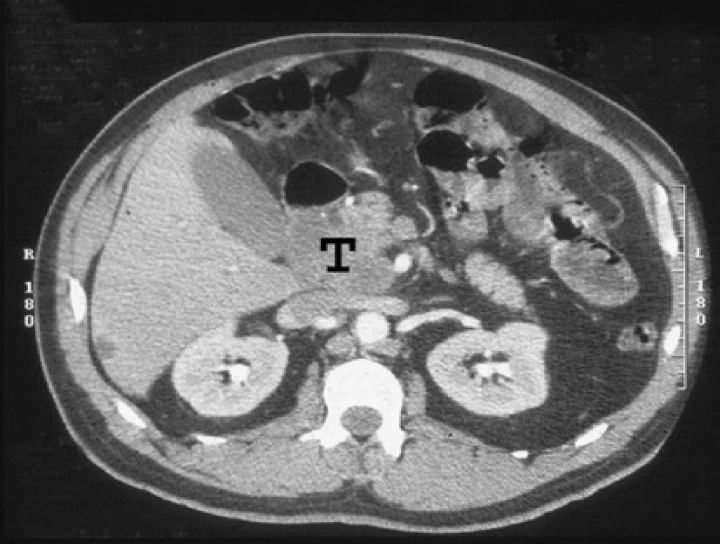
**Oral metastasis** as the first manifestation of an extragonadal primary choriocarcinoma of the pancreas is an exceptionally rare and unusual clinical scenario. Choriocarcinoma is a malignant tumor typically associated with the placenta or germ cell origin, but it can occasionally present in extragonadal sites, such as the pancreas. Here’s a detailed examination of this rare presentation:
### Overview of Choriocarcinoma
**1. **Definition and Origin:**
- **Choriocarcinoma:** A type of germ cell tumor characterized by the presence of trophoblastic cells resembling those in the placenta. It is most commonly associated with the placenta in pregnancy but can also arise in non-placental sites.
- **Extragonadal Choriocarcinoma:** Refers to choriocarcinoma occurring outside the gonads (testes or ovaries), often in locations such as the pancreas, liver, or mediastinum.
**2. **Primary Sites:**
- **Extragonadal Locations:** Includes rare sites like the pancreas, where it is an unusual presentation and poses diagnostic challenges.
### Clinical Presentation
**1. **Oral Metastasis:**
- **Initial Manifestation:** Oral metastasis as the initial manifestation of choriocarcinoma is highly uncommon. The oral lesions may appear as ulcerated, painful, or bleeding masses in the oral cavity.
- **Symptoms:** Patients may present with oral pain, swelling, and lesions that do not respond to conventional treatments or mimic other pathologies.
**2. **Pancreatic Choriocarcinoma:**
- **Symptoms:** In the pancreas, the tumor might present with abdominal pain, weight loss, and jaundice. Pancreatic choriocarcinoma can be aggressive and may not always produce specific symptoms early on.
### Diagnostic Approach
**1. **Clinical Examination:**
- **Oral Examination:** Detailed examination of oral lesions, including biopsy, is crucial to diagnose the nature of the lesions.
**2. **Histopathology:**
- **Biopsy:** A biopsy of oral lesions is essential for histopathological evaluation. Choriocarcinoma typically shows high cellularity with trophoblastic cells and may be positive for human chorionic gonadotropin (hCG).
- **Immunohistochemistry:** Confirmation of choriocarcinoma includes the detection of hCG and other markers specific to trophoblastic cells.
**3. **Imaging Studies:**
- **CT Scan/MRI:** To assess the primary site and extent of metastasis, imaging studies of the abdomen and pelvis are necessary.
- **PET Scan:** May be used to detect metastases and evaluate the extent of disease.
**4. **Serological Tests:**
- **hCG Levels:** Elevated serum human chorionic gonadotropin (hCG) levels can support the diagnosis of choriocarcinoma and are used to monitor treatment response.
### Treatment and Management
**1. **Systemic Therapy:**
- **Chemotherapy:** The mainstay of treatment for choriocarcinoma, including extragonadal types, is chemotherapy. Regimens may include agents such as methotrexate, etoposide, and cisplatin.
- **Targeted Therapy:** In certain cases, targeted therapies or newer agents may be considered based on the specific characteristics of the tumor and patient response.
**2. **Surgical Intervention:**
- **Primary Tumor Resection:** Surgical resection of the primary tumor, if feasible, may be considered in conjunction with chemotherapy.
- **Metastatic Lesion Management:** Surgical or other local therapies may be employed for managing metastatic oral lesions, often in conjunction with systemic treatment.
**3. **Supportive Care:**
- **Pain Management:** Addressing pain and other symptoms related to both oral lesions and systemic disease.
- **Nutritional Support:** Providing nutritional support if oral lesions interfere with eating.
### Prognosis and Follow-Up
**1. **Prognosis:**
- **Aggressive Nature:** Choriocarcinoma is generally aggressive with a poor prognosis, particularly in extragonadal locations. Early diagnosis and treatment are critical for improving outcomes.
- **Outcome Dependent:** Prognosis depends on the stage of disease, response to treatment, and the extent of metastasis.
**2. **Follow-Up:**
- **Monitoring:** Regular follow-up with imaging and serological tests to monitor disease progression and response to treatment.
- **Multidisciplinary Care:** Involves collaboration among oncologists, oral surgeons, and other specialists to provide comprehensive care.
### Conclusion
Oral metastasis as the first manifestation of extragonadal primary choriocarcinoma of the pancreas is an exceptionally rare presentation, posing significant diagnostic and therapeutic challenges. Early recognition through detailed clinical evaluation, biopsy, and imaging studies is crucial for appropriate management. Treatment typically involves a combination of chemotherapy, supportive care, and possibly surgical interventions, with ongoing follow-up necessary to manage the aggressive nature of the disease and assess treatment efficacy.


No Any Replies to “Oral Metastasis as the First Manifestation of an Extragonadal Primary Choriocarcinoma of Pancreas”
Leave a Reply